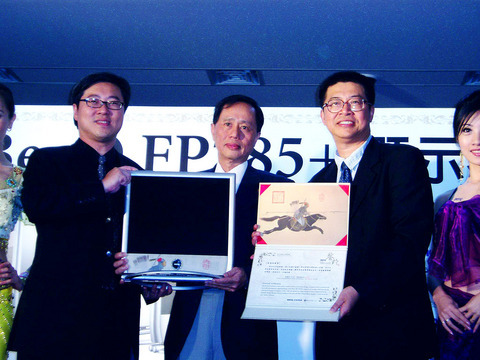BenQ Corp (
"We hope BenQ Taiwan's net income will post growth starting next year onward as we are losing money this year," said Hank Horng (
Combined revenues of liquid-crystal-display televisions and monitors account for as much as 50 percent of BenQ's total local sales, Horng said. But he declined to reveal exact figures.

PHOTO: WANG YI-SUNG, TAIPEI TIMES
BenQ, also the nation's top handset maker, has seen its business in Taiwan decline over recent years, as consumers have given its handsets and notebooks, which account for around 20 percent and 15 percent respectively of total revenues, a lackluster reception.
"It has been a tough year in terms of the mobile phone segment ? and it will become harder to sell notebooks next year because of market saturation," said Horng, also BenQ Taiwan's general manager.
BenQ said earlier this month that it had lost at least 840 million euros (US$1.1 billion) with BenQ Mobile GmbH & Co, the handset business the Taiwanese company set up after purchasing the loss-making mobile phone business of Siemens AG last October.
BenQ is slated to release its third-quarter financial results on Tuesday, and is expected to talk about the future direction for its mobile phone unit as well as the separation of its brand and contract manufacturing businesses.
Meanwhile, BenQ said yesterday it plans to close 10 sales offices in Europe and Latin America, as well as a Brazil handset factory that it bought from Siemens.
"As we decided not to invest further in our German handset unit and the unit's holding company in the Netherlands, we will re-evaluate the financial situation of all subsidiaries under the holding company for possible closure," Eric Yu (游克用), BenQ's chief financial officer, said in a filing to the Taiwan Stock Exchange yesterday.
The impact of the decision to close them would be "minimal" to BenQ's operations, he said.
BenQ announced on Sept. 28 that it had decided to stop funding Munich-based BenQ Mobile in order to stem losses. The German unit filed for insolvency the next day.
The company said at the time that it was reviewing the financial position of its handset units in Brazil and other locations.
BenQ will rebuild its sales operations in some European and Latin American markets, while at the same time continuing business in Asia, China and India, which are less affected by the funding issue as they belong to the parent company.

BYPASSING CHINA TARIFFS: In the first five months of this year, Foxconn sent US$4.4bn of iPhones to the US from India, compared with US$3.7bn in the whole of last year Nearly all the iPhones exported by Foxconn Technology Group (富士康科技集團) from India went to the US between March and last month, customs data showed, far above last year’s average of 50 percent and a clear sign of Apple Inc’s efforts to bypass high US tariffs imposed on China. The numbers, being reported by Reuters for the first time, show that Apple has realigned its India exports to almost exclusively serve the US market, when previously the devices were more widely distributed to nations including the Netherlands and the Czech Republic. During March to last month, Foxconn, known as Hon Hai Precision Industry

Taiwan Semiconductor Manufacturing Co (TSMC, 台積電) and the University of Tokyo (UTokyo) yesterday announced the launch of the TSMC-UTokyo Lab to promote advanced semiconductor research, education and talent development. The lab is TSMC’s first laboratory collaboration with a university outside Taiwan, the company said in a statement. The lab would leverage “the extensive knowledge, experience, and creativity” of both institutions, the company said. It is located in the Asano Section of UTokyo’s Hongo, Tokyo, campus and would be managed by UTokyo faculty, guided by directors from UTokyo and TSMC, the company said. TSMC began working with UTokyo in 2019, resulting in 21 research projects,

Ashton Hall’s morning routine involves dunking his head in iced Saratoga Spring Water. For the company that sells the bottled water — Hall’s brand of choice for drinking, brushing his teeth and submerging himself — that is fantastic news. “We’re so thankful to this incredible fitness influencer called Ashton Hall,” Saratoga owner Primo Brands Corp’s CEO Robbert Rietbroek said on an earnings call after Hall’s morning routine video went viral. “He really helped put our brand on the map.” Primo Brands, which was not affiliated with Hall when he made his video, is among the increasing number of companies benefiting from influencer

Quanta Computer Inc (廣達) chairman Barry Lam (林百里) yesterday expressed a downbeat view about the prospects of humanoid robots, given high manufacturing costs and a lack of target customers. Despite rising demand and high expectations for humanoid robots, high research-and-development costs and uncertain profitability remain major concerns, Lam told reporters following the company’s annual shareholders’ meeting in Taoyuan. “Since it seems a bit unworthy to use such high-cost robots to do household chores, I believe robots designed for specific purposes would be more valuable and present a better business opportunity,” Lam said Instead of investing in humanoid robots, Quanta has opted to invest